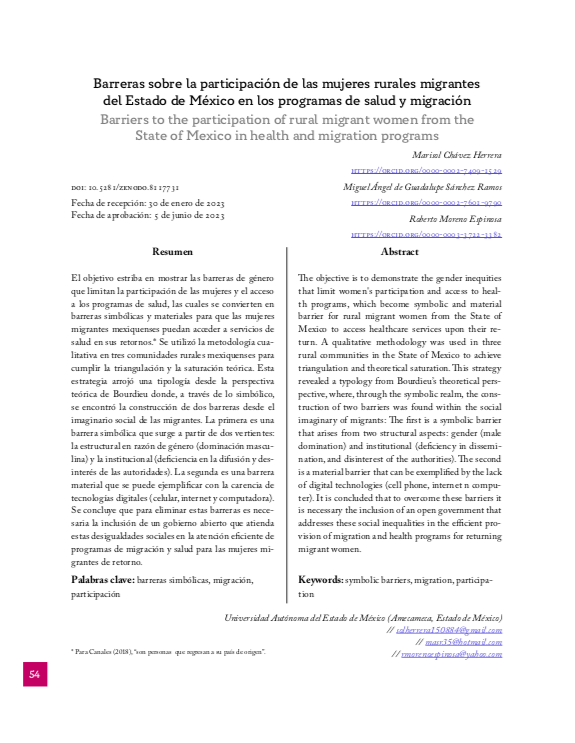Abstract
The purpose is to show the gender inequities that limit women's participation and access to health programs, becoming a symbolic and material barrier for Mexican migrant women on their returns. The qualitative methodology was used in three Mexican rural communities, fulfilling the triangulation and theoretical saturation. This strategy produced a typology from Bourdieu's theoretical perspective where, through the symbolic, the construction of two barriers was found from the social imaginary of migrants.
References
Argueta, L. (2021). Género y Participación social en salud desde la experiencia ciudadana en el Salvador. Revista La Ventana, 6(54), pp. 240-274. https://www.scielo.org.mx/scielo.php?script=sci_arttext&pid=S1405-94362021000200240
Bourdieu, P. (2000). La dominación masculina. Anagrama.
Campo, A., Oviedo, H., y Herazo, E. (2014). Estigma: barrera de acceso a servicios en salud mental. Revista Colombiana de Psiquiatría, 43(3), pp. 162-167. https://www.redalyc.org/pdf/806/80633732007.pdf
Consejo Estatal de Población. (1 de octubre del 2015). El contexto migratorio en el estado de México, encuesta intercensal, COESPO. https://coespo.edomex.gob.mx/sites/coespo.edomex.gob.mx/files/files/migracionv2.pdf
Consejo Nacional de Población. (8 de agosto del 2016). Índice de marginación por entidad federativa y municipio 2015.https://www.gob.mx/conapo/documentos/indice-de-marginacion-por-entidad-federativa-y-municipio-2015.
Consejo Estatal de Población. (4 de agosto del 2019). Marginación, COESPO. https://coespo.edomex.gob.mx/sites/coespo.edomex.gob.mx/files/files/2019/Nuevos/Marginacio%CC%81n.pdf.
Consejo Nacional de Población. (5 de marzo del 2020). Índice de marginación del Estado de México. https://coespo.edomex.gob.mx/indice_marginacion.
Consejo Nacional de Población. (3 de abril del 2022). Índices de marginación. https://www.gob.mx/conapo/documentos/indices-de-marginacion-2020-284372
Cunill, G. (2019). Repensando lo público a través de la sociedad. Nuevas formas de gestión pública y representación social. Nueva sociedad. https://sitp.pichincha.gob.ec/repositorio/diseno_paginas/archivos/Repensando%20lo%20p%C3%BAblico%20a%20trav%-C3%A9s%20de%20la%20sociedad.pdf
Grennhaus, J.H., Collins, K. y Shaw, J.D. (2003). The relation between work-family balance and quality of life. J Vocat Behav, 63 (3), pp. 510-531. https://doi.org/10.1016/S0001-8791(02)00042-8
Hirmas, M., Poffald, L. Jasmen, A., Aguilera, X., Delgado, I. y Vega, J. (2013). Barreras y facilitadores de acceso a la atención de salud: una revisión sistemática cualitativa. Revista Panam Salud Publica, 33(3), pp. 223-9. https://www.paho.org/journal/sites/default/files/09--Arti--Hirmas--223-229.pdf
Lagarde, M. (2001). Las mujeres queremos el poder. Revista Envío, (228). https://www.envio.org.ni/articulo/1067
López, A. (15 de agosto, 2022). La mañanera. Canal Once.
Mesmer, J.R. y Viswesvaran, C. (2005). Convergence between measures of work-to-family and family-to-work conflict: A metanalytic examination life. J Vocat Behav, 67(2), pp. 215-232. 10.1016/j.jvb.2004.05.004
Monteverde, G. (1996). ¿Por qué trabajan las mujeres? Revista El Colegio de Sonora, 7(12), pp. 161-167. http://lanic.utexas.edu/project/etext/colson/12/12_6.pdf
Parker, S. y Knaul, F. (1998). Estrategias de empleo y cuidado de los niños entre mexicanos con hijos pequeños: un análisis ecométrico, Finanzas del Instituto Mexicano. Revista Estudios Demográficos y Urbanos. (75), pp. 1-41. http://repositorio-digital.cide.edu/bitstream/handle/11651/5398/12801.pdf?sequence=1&isAllowed=y
Sánchez, M. (9 mayo 2019). 4 Plan de Acción de México 2019-2021. Gobierno de México. Secretaria de la Función Pública. https://descarga.storage.apps.funcionpublica.gob.mx/b31f9fd4-47cb-4050-8012-b259dae559d1
Sánchez, M. (02 de enero del 2022). Construcción de la ciudadanía: una reflexión desde el constructivismo social y la neuropolitica. file:///C:/Users/Marisol/Downloads/Construccion_de_Ciudadania_una_reflexion%20(5).pdf
Serrano, A. (2015). La participación ciudadana en México. Revista Estudios Políticos, 9(34), pp. 93-116. https://www.redalyc.org/pdf/4264/426439555004.pdf
Taylor, S.J. y Bogdan, R. (1984). Introducción a los métodos cualitativos de investigación, Paidós.
Villareal, M. (7 de agosto del 2010). Participación ciudadana y política pública, en academia. http:/itesm.academia.edu/VillarrealMart%C3%ADnezMar%C3%ADaTeresa

This work is licensed under a Creative Commons Attribution-NonCommercial-ShareAlike 4.0 International License.
Copyright (c) 2023 Albores


